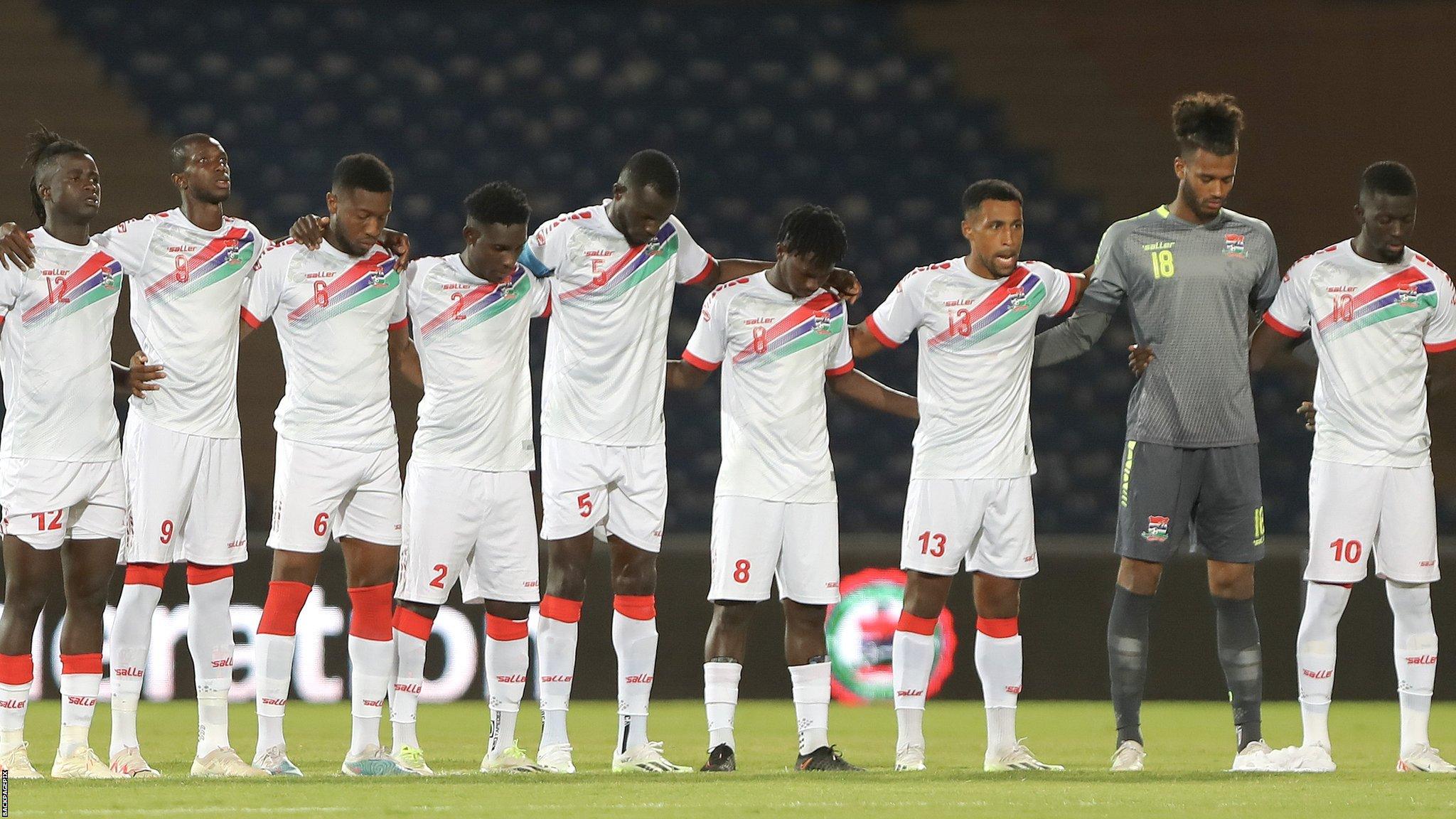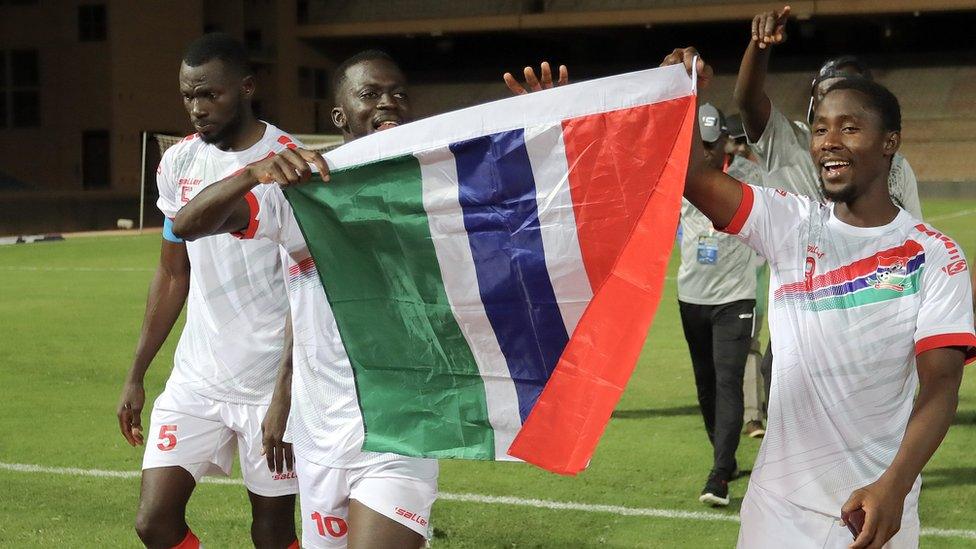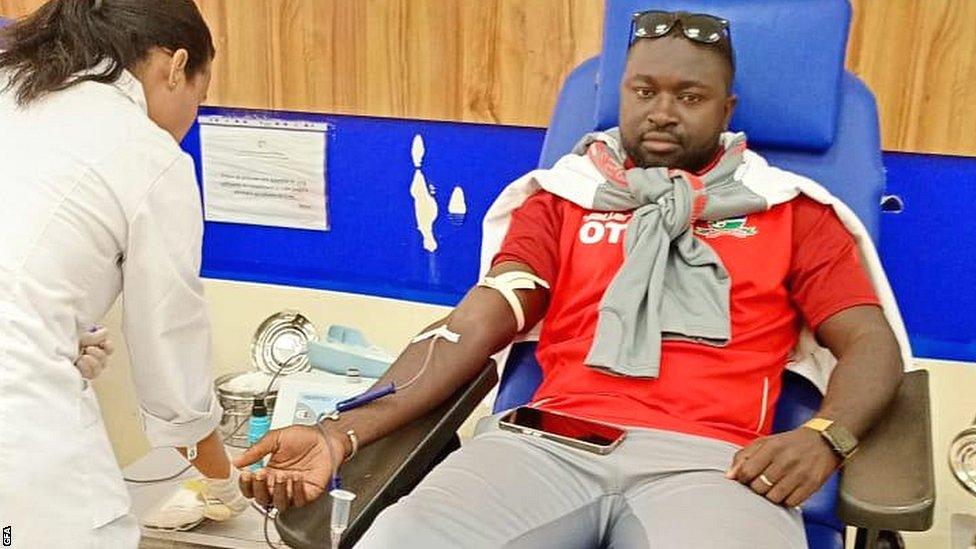Morocco earthquake: Gambian minds 'not on the game' prior to Afcon qualification
- Published
The Gambia captain Omar Colley tells his "nightmare" story of being caught up in the earthquake in Morocco
Captain Omar Colley says he still cannot celebrate The Gambia's qualification for the Africa Cup of Nations (Afcon) given the trauma of being caught up in the Moroccan earthquake.
Without a suitable stadium to host international football, the West Africans' final 2023 Afcon qualifier against Congo-Brazzaville had been moved to Marrakesh. Colley and his team-mates were in the city when the magnitude 6.8 earthquake struck nearby late on Friday evening; nearly 3,000 people died.
The Gambians had to play their decisive qualifier within 48 hours, coming back from two goals down to secure a finals place with a 90th-minute equaliser in a 2-2 draw.
"I still cannot celebrate how I would want to when we qualify because I still cannot believe what happened," the 30-year-old told BBC Sport Africa.
"After everything we went through, I still cannot get it out of my head when I sit down alone. Anytime I hear a noise or whatever - the sound of a car or an aeroplane - I feel like it's coming back."

Captain Omar Colley (centre, number 5) and his Gambian team-mates line up ahead of their crunch Africa Cup of Nations qualifier against Congo-Brazzaville on Sunday in earthquake-hit Marrakesh
Colley, who joined Turkish side Besiktas in February after five years with Sampdoria in Italy, says he suffered a panic attack for the first time in his life as the devastating tremor unfolded.
"After the quake, I ran to the swimming pool where the team manager asked me if I was OK, but I couldn't say a word," he recalled of his ordeal.
The defender said he found it "so sad" when he learned that The Gambia had to fulfil their final Group G tie despite the devastation all around them, while Scorpions coach Tom Saintfiet questioned the morality of deploying medical staff to the match given priorities elsewhere.
"The few policemen and the few people from the Red Cross who were around the stadium could have been used to rescue people - as football is then not important," the Belgian told the BBC.
The Confederation of African Football (Caf) did accept Morocco's request to postpone their tie against Liberia, saying the hosts were "directly impacted by the tragedy", but the Gambian delegation did not submit such a proposal.
"I was little bit disappointed because playing in a country where there's been a natural disaster, with the loss of thousands of lives, I thought Caf would have cancelled the game until the next window," Colley said.
"I think people sometimes forget that we are human beings. Just imagine hiding your emotions and feelings before then playing a most difficult game.
"Our second half display was, to me, a miracle and one of the greatest comebacks in the history of African football."
'It was a nightmare'

Like thousands of buildings, The Gambia's hotel in Marrakesh suffered damage in Friday night's quake
As he freely admits, Colley - who became The Gambia's permanent captain in 2021 - has been left emotionally distressed by Friday's quake, which took place 71 kilometres south-west of Marrakesh, high in the Atlas Mountains.
"I was deep asleep when it happened - it was like I was having a nightmare - and I woke instantly without knowing what was happening," the player recalled of the moment Morocco was hit at 23:11 local time.
"I tried to open my hotel room door but couldn't because there was concrete falling in front of it."
"Then I ran to try to open the back door because I was on the second floor - to maybe try to jump. But as soon as I tried, the glass door started shaking, so I couldn't even pull it."
"I went back to the front door, with all the pieces falling, and found my way down to the reception where there was no one as it was almost destroyed."
Colley joined Besiktas just two days after the devastating 6 February Turkey earthquake that left more than 50,000 dead and forced over 150,000 to live in tents, containers and other makeshift accommodation.
Amid the terror of Friday's tremor, his thoughts turned to the fear of the aftershocks his current home endured.
"At that moment, I thought the world is coming to an end because I saw how people were suffering in Turkey," he said.
Upon his return to Istanbul earlier this week, Colley sought professional help.
"I spoke to the club psychologist who told me that if you want to get rid of everything, you just need to voice it out, speak to your family and then maybe it will make you feel better," he said.
"I explained to my wife what happened and she was in a big shock that I played this game. I spoke to my sister and my [Besiktas] team-mates, and that made me feel better."
"With people around me, I think everything will normalise."

Omar Colley (left) is pictured during The Gambia's muted celebrations upon reaching Afcon 2023
'Our heads were not on the game'
After the quake, the team gathered by the hotel swimming pool which swiftly turned into a sleeping area for the remainder of their stay, given the fear of aftershocks.
Sleeping outdoors while exposed to the elements in a desert climate took a toll on some players, with Colley saying he barely slept during the two nights that preceded Sunday's game with Congo-Brazzaville.
"It was cold and most of us requested extra blankets," he explained. "I had fever the night before the game and so was on painkillers and couldn't eat, but this was the sacrifice for my country."
Amid the emotional toll, the team managed to gather their strength and focus for a qualifier where a win or draw would secure The Gambia's place in January's finals in Ivory Coast.
"I was not thinking about football and our heads were not on the game - we were only thinking of going home and being with our families - but then the news came that we had to play," Colley revealed.
"It was really tough for all of us. We had a team meeting and I said we were playing for Gambians, and the only thing we can do is to focus for 90 minutes. When we got onto the pitch, it was a different feeling. We forgot everything, even though it was not easy, to focus on the game."
Afcon 2023 qualification feat
Despite trailing 2-0 with 11 minutes to go, the Scorpions pulled off a comeback to book their spot at a second straight Nations Cup after 50 previous years of qualification failure.
Muhammed Badamosi was a key man as the substitute not only assisted the team's first goal but then also scored the all-important equaliser in the 90th minute.
"It was an amazing feeling with lots of emotions, coming off the bench and then scoring," Bedamosi told BBC Sport Africa.
"People sent me videos of my family members and of my hometown celebrating. It was emotional, made me feel proud and I understood what qualifying for the Nations Cup means for people back home."
As Gambians celebrated, the delegation itself held back its excitement.

Members of the Gambian squad and coaching staff gave blood in Morocco before returning home
"Moroccans were grieving so obviously you cannot do crazy celebrations out of respect for the people of Morocco," stated Colley.
"It was a difficult moment for not only them but all of us because we were in this together. It was like a nightmare at the same time as a dream come true."
Before leaving Morocco, some of the Gambian delegation joined the blood donation drive for the victims of the earthquake while the group also showed support through financial donations.
"After the game, the first thing that we talked about was that we will donate blood and give some money from our camp allowance - we all contributed," Colley said.
"We didn't do it for fame or publicity but from our hearts. Even if it's one euro, it will make a difference."